Featured Topics
Featured Products
Events
S&P Global Offerings
Featured Topics
Featured Products
Events
S&P Global Offerings
Featured Topics
Featured Products
Events
S&P Global Offerings
Featured Topics
Featured Products
Events
Financial and Market intelligence
Fundamental & Alternative Datasets
Government & Defense
Professional Services
Banking & Capital Markets
Economy & Finance
Energy Transition & Sustainability
Technology & Innovation
Podcasts & Newsletters
Financial and Market intelligence
Fundamental & Alternative Datasets
Government & Defense
Professional Services
Banking & Capital Markets
Economy & Finance
Energy Transition & Sustainability
Technology & Innovation
Podcasts & Newsletters
ECONOMICS COMMENTARY — Jan 20, 2023

By Rajiv Biswas
The Philippines economy has rebounded strongly during 2022 from the negative impact of the COVID-19 Delta wave that hit the nation in the second half of 2021. In the third quarter of 2022, GDP growth was up 7.6% year-on-year (y/y), after rising by 7.5% y/y in the second quarter. The latest S&P Global Philippines Manufacturing PMI reached a six-month high in December 2022, signaling sustained growth across the Philippines manufacturing sector.
Over the decade ahead, rapid economic growth is forecast for the Philippines economy. By 2034 the Philippines is set to join the ranks of a small group of countries in the Asia-Pacific region that have a GDP exceeding one trillion dollars. This will result in a significant transformation of the structure of the Philippines economy, with substantial expansion in the size of the domestic consumer market. This will also help to drive foreign direct investment inflows into the Philippines, as multinationals build up their local presence in a wide range of manufacturing and service sector industries.
The Philippines economy has shown strong growth momentum during 2022, with GDP growth rising to 7.6% y/y in the third quarter of 2022. The easing of domestic COVID-19 restrictions during 2022 has allowed the rebound of household consumption spending, which helped to drive strong economic growth. Household consumption expenditure grew by 8.0% y/y in the third quarter of 2022, while gross capital formation rose by 21.7% y/y.
Philippines GDP growth, 2019-2022
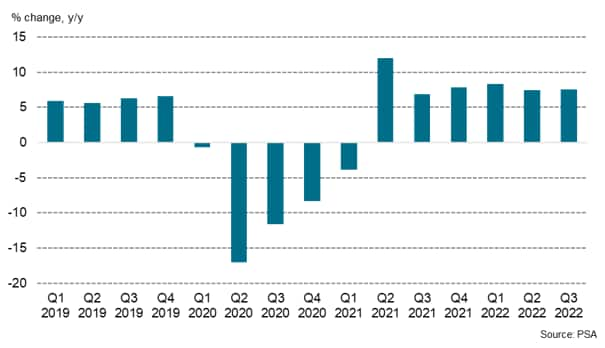
The S&P Global Philippines Manufacturing PMI continued to post above the 50.0 no-change mark that separates growth from contraction in December 2022. The headline index rose from 52.7 in November to a six-month high of 53.1 in December.
A solid expansion in production levels was reported during December as rate of growth quickened, indicating the fastest rise in output levels since June. The data pointed to domestic demand being the driving force behind the latest upturn in incoming new business, as foreign orders contracted for the tenth month running.
Philippines Manufacturing PMI
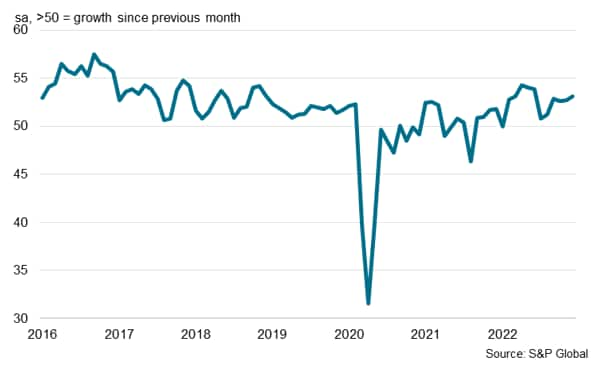
Merchandise exports have continued to record strong expansion, rising by 13.2% y/y in November 2022, showing resilience to the impact of the slowdown in mainland China, which is a key export market. An important driver for merchandise exports has been electronics exports, which rose by 22.9% y/y in November, accounting for 64% of total merchandise exports. For the first eleven months of 2022, merchandise exports rose by 7% y/y.
However, imports have shown even more rapid growth, rising by 20.3% y/y in the first eleven months of 2022. Consequently, the trade deficit for the first eleven months of 2022 rose to USD 53.7 billion, compared with USD 37.1 billion in the same period of 2021.
The transmission effects from weaker growth in the US and Western Europe are a vulnerability for the Philippines export sector in 2023, since the US accounted for 15.6% of total exports and the EU accounted for 10.4% of total Philippines exports in 2021.
In 2020, the current account surplus reached a record high of USD 11.6 billion or 3.2% of GDP, boosted by the sharp slump in imports due to the severe contraction in domestic demand. However, the current account shifted back to a deficit of USD 6.0 billion in 2021, or 1.5% of GDP, as growth recovery triggered higher domestic demand and rising imports.
Imports soared during 2022, with surging prices for world oil and gas being important factor contributing to a further sharp deterioration in the current account balance for calendar 2022. In December 2022, the Philippines central bank, Bangko Sentral ng Pilipinas (BSP), revised down its current account projection for 2022 to a deficit of USD 20.5 billion or 5.1% of GDP due to a widening trade deficit, as the economic recovery and rising oil prices pushed up imports. This was a significant downward revision from its March 2022 projection of a current account deficit of USD 16.3 billion, or 3.8% of GDP.
Philippines export markets
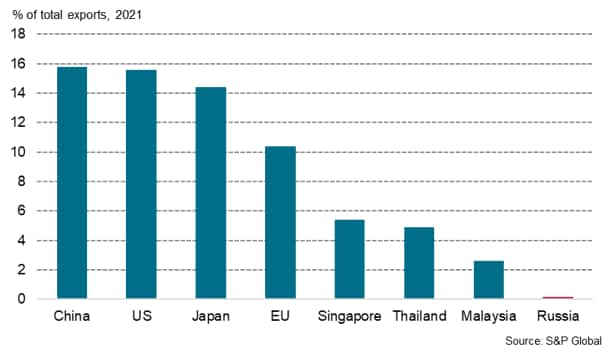
An important stabilizing factor for the Philippines economy has been overseas worker remittances by Filipinos working abroad, which remained quite stable during 2020 despite the COVID-19 pandemic, down only 0.8% y/y, and equivalent to around 10% of GDP. Remittances sent home by workers are an important factor supporting domestic consumer spending in the Philippines. Despite concerns about job losses for workers abroad due to the impact of the pandemic on many industries such as tourism and aviation, remittances data continues to show resilient remittance inflows for 2021. Remittances by workers abroad rose by 5.1% y/y in 2021, to a record high of USD 34.9 billion. In the first eleven months of 2022, remittances by workers abroad rose by 3.4% y/y, to USD 32.7 billion.
Rapid growth in exports from the IT-BPO sector have also become an important boost for the Philippines economy and for total exports. IT-BPO exports have risen from USD 9.5 billion in 2010 to USD 25.1 billion by 2021, according to BSP estimates.
During 2022, inflation pressures have been rising in the Philippines, with higher energy prices having been a key factor pushing up the CPI inflation rate. Both average cost burdens and output charges rose markedly during 2022. However, according to recent S&P Global Philippines Manufacturing PMI surveys, there has been some easing of price pressures during the fourth quarter of 2022, although rates of inflation remain high and an ongoing threat to demand. In December, the pace of increase in cost burdens was the slowest for three months, whilst firms raised their selling prices at the softest rate for a year in December amid efforts to drive sales.
Philippines PMI Input and Output Prices
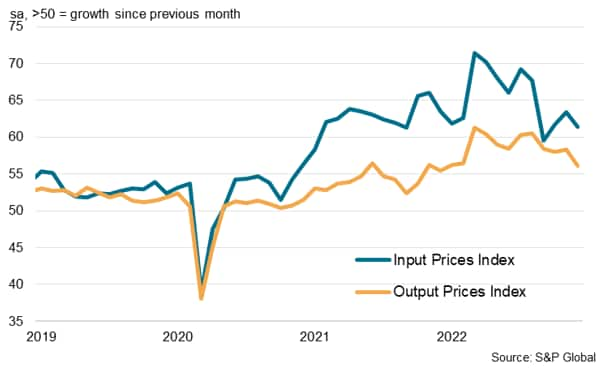
Bangko Sentral ng Pilipinas (BSP) has faced rising headline CPI inflation pressures driven by rising energy and food prices, with the December CPI having risen to 8.1% y/y, compared with 3.0% y/y in January 2022. With CPI inflation having moved significantly above the BSP inflation target range of 2% to 4%, the BSP has tightened monetary policy by a total of 350bps during 2022. The rate hike of 0.25bps on 20th May was the first rate hike since November 2018. Faced with rising headline CPI inflation pressures, the BSP continued to tighten monetary policy during the second half of 2022, closing the year with hikes of 75bps on 17th November and a further 50bps on 16th December. This pushed the policy rate to 5.5% by the end of 2022. In its November 2022 Monetary Policy Report, the BSP expected that the CPI inflation rate would likely peak in the fourth quarter of 2022, moderating back to within the BSP inflation target range by the third quarter of 2023.
ASEAN CPI inflation compared to US & EU, November 2022
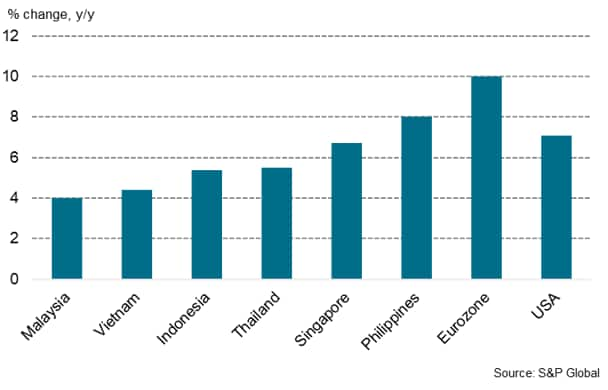
The Philippines peso had depreciated against the USD during much of 2022, from 51.0 per USD on 1st January to 59.2 per USD by 10 October, as the US Fed tightened monetary policy aggressively, which increased the relative attractiveness of the USD and US fixed income assets. However, since mid-October the PHP has rebounded, rising to 55.7 by end-December 2022 and 54.7 by mid-January 2023.
Despite the impact of the COVID-19 Delta wave in the second half of 2021, GDP growth for calendar 2021 rebounded to 5.6% y/y. Strong growth momentum has continued in 2022, at a pace of over 7% y/y in the second and third quarters of the year.
Easing of pandemic-related travel restrictions during 2022 has also allowed a gradual reopening of domestic and international tourism travel. If sustained during 2023, this would provide an important boost to the economy. Prior to the pandemic, in 2019, gross direct tourism value added as a share of GDP was estimated at 12.7% of GDP, including both international and domestic tourism spending. International tourism spending was estimated at Peso 549 billion, while domestic tourism spending was estimated at Peso 3.1 trillion. Due to the importance of domestic tourism in the overall contribution of tourism to GDP, the recovery of domestic tourism could be a significant growth driver in 2023.
Philippines long-term GDP outlook
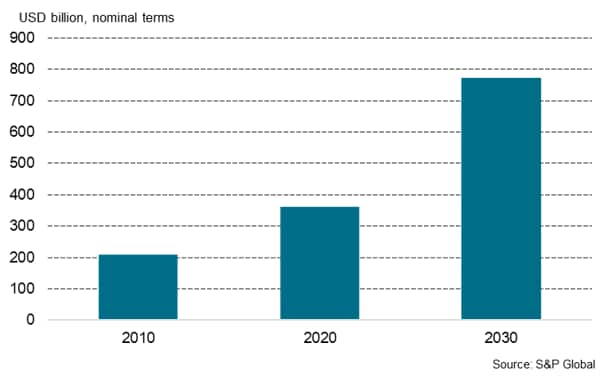
Continued rapid GDP growth of around 5.6% y/y is expected in 2023, helped by continued strong private consumption spending, an upturn in government infrastructure spending and improving remittance inflows.
Over the next decade the Philippines economy is forecast to continue to grow rapidly, with total GDP increasing from USD 400 billion in 2021 to USD 830 billion in 2031. A key growth driver will be rapid growth in private consumption spending, buoyed by strong growth in urban household incomes.
By 2034, the Philippines is forecast to become on the Asia-Pacific region's one trillion-dollar economies, joining mainland China, Japan, India, South Korea, Australia, Taiwan and Indonesia in this grouping of the largest economies in APAC.
This strong growth in the size of the Philippines economy is also expected to drive rapidly rising per capita GDP, from USD 3,500 in 2021 to USD 6,400 by 2031. This will help to underpin the growth of the Philippines domestic consumer market, catalysing foreign and domestic investment into many sectors of the Philippines economy.
Philippines per capita GDP
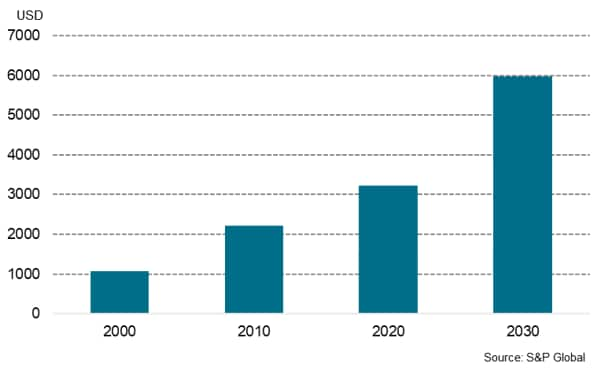
The Philippines will also benefit from its membership of the recently implemented RCEP trade deal, particularly due to its very favourable rules of origin treatment, which provide cumulative benefits that will help to build manufacturing supply chains within the RCEP region across different countries. This will help to attract foreign direct investment flows for a wide range of manufacturing and infrastructure projects into the RCEP member nations, particularly into low-cost manufacturing hubs such as the Philippines.
Consequently, the outlook for the Philippines economy over the next decade is very favourable, with significant progress in economic development expected. Rapidly rising per capita GDP and standards of living will help to underpin a broad improvement in human development indicators and should deliver a significant reduction in share of the population living in extreme poverty over the decade ahead.
Read the accompanying press release here.
Rajiv Biswas, Asia Pacific Chief Economist, S&P Global Market Intelligence
Rajiv.biswas@spglobal.com
© 2023, S&P Global Inc. All rights reserved. Reproduction in whole or in part without permission is prohibited.
Purchasing Managers' Index™ (PMI™) data are compiled by IHS Markit for more than 40 economies worldwide. The monthly data are derived from surveys of senior executives at private sector companies, and are available only via subscription. The PMI dataset features a headline number, which indicates the overall health of an economy, and sub-indices, which provide insights into other key economic drivers such as GDP, inflation, exports, capacity utilization, employment and inventories. The PMI data are used by financial and corporate professionals to better understand where economies and markets are headed, and to uncover opportunities.
This article was published by S&P Global Market Intelligence and not by S&P Global Ratings, which is a separately managed division of S&P Global.